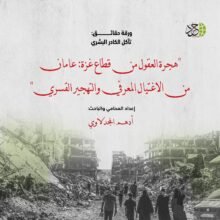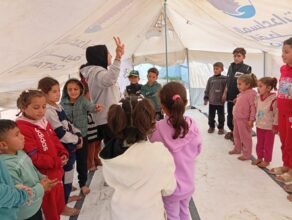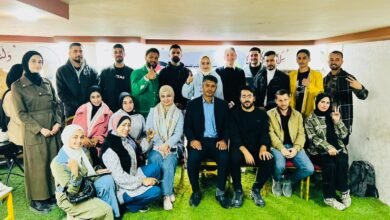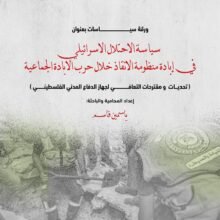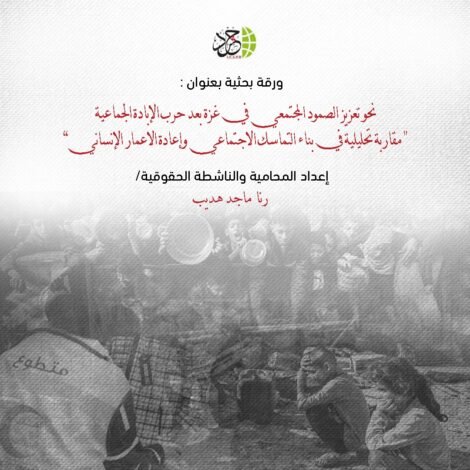
ICSPR Issues Comprehensive Policy Paper on Strengthening Community Resilience in Gaza Following the Genocidal War
Date: November 1, 2025
Press Release
ICSPR Issues Comprehensive Policy Paper on Strengthening Community Resilience in Gaza Following the Genocidal War
The International Commission to Support the Rights of the Palestinian People (ICSPR) has released an extensive policy paper entitled “Towards Strengthening Community Resilience in Gaza after the Genocidal War: An Analytical Approach to Social Cohesion and Humanitarian Reconstruction”, prepared by lawyer and human rights activist Rana Majid Hadeeb. This paper represents a strategic scientific step in documenting the effects of the recent war on the Gazan community, analyzing dimensions of community resilience, and providing a practical framework for sustainable humanitarian and social reconstruction in the Gaza Strip.
The paper focuses on community resilience as a daily practice that reflects the Gazan community’s ability to sustain life and productivity despite ongoing attempts by the occupation to dismantle its social fabric. Community resilience is presented as a practice of transformative justice, moving beyond merely addressing the aftermath of war toward reshaping the relationships between individuals and institutions on more equitable and participatory grounds. The study highlights that the recent war, which erupted on October 7, 2023, resulted in widespread destruction of infrastructure and residential buildings, internal displacement of over 1.9 million people, near-total collapse of water, electricity, and communication networks, and disruption of 81% of roads. Unemployment rates surged to approximately 80%, and tens of thousands of families lost their sources of income, leading to severe poverty and widespread food insecurity.
The paper aims to build a comprehensive understanding of the concept of community resilience in Gaza post-war by analyzing structural, social, and economic challenges, documenting local initiatives, and proposing practical strategies to enhance sustainable resilience through activating civil society, restoring institutional trust, and establishing fair partnerships between local and international stakeholders.
The study reveals major structural challenges facing the Gazan community, ranging from destroyed infrastructure and basic services to a collapsed economy, high poverty rates, weak local institutions, and poor field governance, alongside uneven support and reconstruction across different areas. The war also reshaped the social fabric, affecting trust between individuals and institutions and creating unprecedented collective trauma among children and women, while limiting the role of youth and women in recovery efforts and decision-making processes.
The paper also examines the war’s impact on key sectors, noting that community resilience is directly linked to justice in resource and opportunity distribution. Gaza’s severely damaged economy requires equitable support for small and medium enterprises to enable economic resilience. Schools damaged by the war underscore the importance of educational equity to ensure continued learning and foster long-term knowledge resilience. The health sector, with heavily damaged hospitals, highlights the need for equitable healthcare distribution as a cornerstone of resilience. Additionally, the loss of housing and infrastructure threatens national identity, while damage to agricultural land and food security emphasizes the necessity of fair distribution of food resources to ensure sustainable resilience.
The paper highlights the critical role of local community initiatives in enhancing resilience. Alternative education programs, psychosocial support, small business empowerment, and agricultural and food initiatives collectively form practical mechanisms to transform resilience from mere survival into a comprehensive community project. Examples cited include the Journey of Recovery initiative providing psychosocial support, the Ghout Gaza team supporting children’s nutritional and mental health needs, the Ibdā’ Youth Program empowering youth and women and supporting small enterprises, and agricultural land rehabilitation projects aimed at strengthening local food security.
The paper also draws lessons from international experiences in countries such as Syria and Lebanon after armed conflicts, noting that sustainable community resilience is achieved not only through physical reconstruction or external aid but also by building inclusive social justice that enables local communities to actively participate, restore trust, ensure equitable access to education, healthcare, and economic opportunities, and guarantee spatial justice in reconstruction while supporting local initiatives and integrating youth and women in planning and implementation processes.
The study concludes that resilience in Gaza is not merely the capacity to survive but a comprehensive community process based on justice, participation, and empowerment. The experience transforms from crisis response into a sustainable transformative project that rebuilds trust and social cohesion. The paper emphasizes that community justice, civil society engagement, and transparency in resource distribution are fundamental to enhancing resilience and converting it into a practical model for sustainable humanitarian reconstruction.


